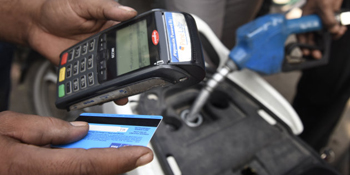New Delhi, Jan 9: Credit and debit cards will continue to be accepted at petrol pumps even after January 13 without customers having to pay transaction charges, the government said today.

"Merchant Discount Rate (MDR) charges will be levied as per RBI guidelines but who will take the hit? Banks, oil marketing companies are discussing," Petroleum Minister Dharmendra Pradhan told reporters after meeting Finance Minister Arun Jaitley on the issue.
"We had assured yesterday also that since retail outlets, petrol pump owners work as commission agents, we will not pass on the cost to them," he said.
Petrol pump operators had yesterday threatened to stop accepting card payments after banks said the transaction charges of up to 1 per cent will have to be borne by them. The crisis was averted after banks agreed not to insist on transaction charges for five more days, leading to pumps owners deferring their plans till January 13.
Pradhan said the government stands by its decision that customers using non-cash digital modes of payments will not have to pay any transaction charge. Also, the 0.75 per cent discount on fuel rate for using digital payments will continue.
"Banks and oil marketing companies (OMCs) are discussing the issue. In the coming days a mechanism will be worked out under which customers or petrol pump owners will not bear the cost," he said.
Pradhan said the government had in February last year issued a circular saying customers will not have to bear the MDR charges on digital transactions so as to help the country move towards digital transaction and less cash economy.
"Government will ensure implementation of that decision," he said. "In the coming days whatever digital transactions happens especially in petrol pumps, the burden will not be passed on to customers."
When a card payment is made using a POS machine, service charges are levied. All stakeholders are discussing who will bear these, he said.
Pradhan said the Reserve Bank of India has come out with a circular on the amount of MDR to be charged for transactions below Rs 1,000, those between Rs 1,000 and Rs 2,000 and those above Rs 2,000.
Asked if petrol pumps will continue to accept card payments after January 13, he said, "They will accept cards. I want to assure the people of the country who want to do digital transactions in petrol pumps, they will continue to do so."
With OMCs already facing Rs 5,000 crore hit from having to bear 0.75 per cent discount on fuel sold using digital modes, Pradhan said the numbers are "fictional".
"It (Levying MDR charges on card transactions) is a business model between banks and OMCs. They will decide who will take how much cost," he said. "Government will not bear the cost."
Card payments involve 2/3 players -- payment gateways, POS machine provider and banks/merchandise outlet. "All these have their own share in the MDR charges. After negotiations, it will be decided to what extent the MDR charges can be brought down that we are discussing," he said.
Pradhan said people can use cards for fuel purchases even after January 13. "0.75 per cent cash back incentive that we have given to customers will also continue."
"It will be resolved before January 13. Bargaining and
negotiations are going on. An amicable solution will be worked out," he said.







Comments
Add new comment